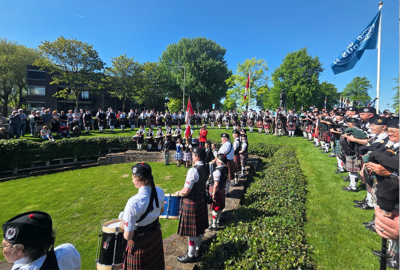Members of Kelowna’s Pipe Band have been honoured guests in Holland this week at events marking the country’s liberation from Nazi Germany 80 years ago.
Dozens of pipers, drummers, and dancers have performed at solemn events in military cemeteries and at joyous celebrations inside ancient cathedrals.
“The streets, the city centres, and parks have been filled with people excited to see the band perform,” band manager Miriam Campbell said this week from Holland.
“The people in the Netherlands have been so appreciative, welcoming and generous during our time here,” Campbell said. “We’ve made so many memories and connections during this trip.”
The band played at a church in the village of Diever in northern Holland and Pipe Major Chad Goodman was presented with the municipal flag of Westerveld, the surrounding municipality. “We even marched off a ferry to symbolize Canadian forces arriving in the Netherlands for the Liberation of Huissen,” Campbell said.
Among the Dutch cities the band visited was Veendam, in north-eastern Holland, which for many years was an official sister city to Kelowna. It was a deep historical and emotional connection, based on the role played by the Kelowna-based B.C. Dragoons in helping to reestablish civilian authority in the town of about 30,000 people after the end of the Second World War in 1945.
The sister city tie was celebrated by frequent trips between Kelowna and Veendam involving veterans, students, and civic officials.
City Park in downtown Kelowna has ‘Veendam Walk’, an entranceway flanked by beds of tulips. In Veendam, the BC Dragoons are honoured through stone memorials, Canadian maple trees, and well-tended gravesites. An entire wing of the Veendam City Hall is called the ‘Kelowna Room’.
“We have prosperity, freedom, and democracy - that’s the ultimate reason you veterans came to the Netherlands in 1945,” Veendam Mayor Sipke Swierstra told a large Kelowna delegation in May 2015.
About 900 men, most from the Okanagan, served with the Dragoons, then a tank regiment, during the Second World War. During combat in Italy and the Netherlands, 99 of them were killed. “I want to thank you very much for taking care of our veterans in graveyards,” the late Dick Gunoff, a Kelowna veteran, told the Dutch hosts during the 2015 trip.
The formal sister city relationship came to an end, however, in 2017, with the dissolution due in part to the fact that there were no longer any Second World War veterans living in Kelowna who were able to make the trip to Holland.
“It’s a shame the sister city relationship ended,” says Tonny Buckley, a Dutch-born 84-year-old Kelowna woman who was active with the group for many years.
“When we went over, it was just incredible to see how enthusiastically we were received. And our veterans, you know, they were just like young boys again when they got over there,” Buckley said.
Although there is no formal sister-city relationship between Kelowna and Veendam, the link lives on in frequent exchanges of students between the two cities. Students from Veendam were hosted in late May by families with teenagers attending KLO Road Middle School.

